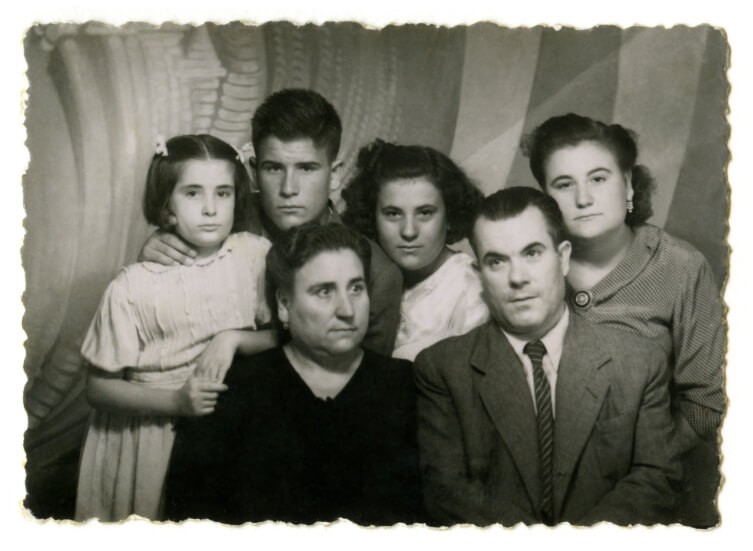
Jesus Navarro, found of the company with his wife Carmen Valero and their four children, from left to right: Conchita, Jesus, Magdalena, and Carmencita.

Little Carmencita dressed up as an Andalusian in the photo that produced the image for the recently created company


Jesus Navarro, found of the company with his wife Carmen Valero and their four children, from left to right: Conchita, Jesus, Magdalena, and Carmencita.
Little Carmencita dressed up as an Andalusian in the photo that produced the image for the recently created company.
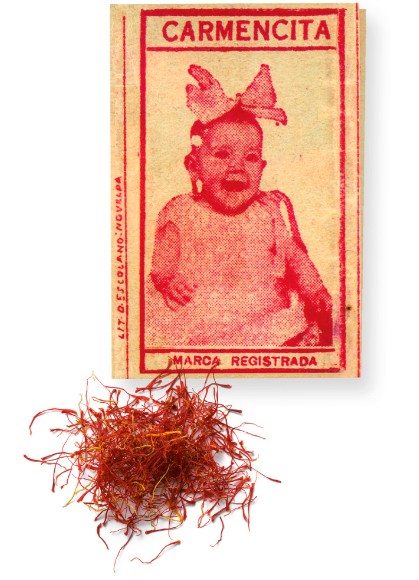
Below on the right, Luis Navarro, Francisco Escolano and Jesus Navarro Valero positioning the brand as the undisputed leader in the market
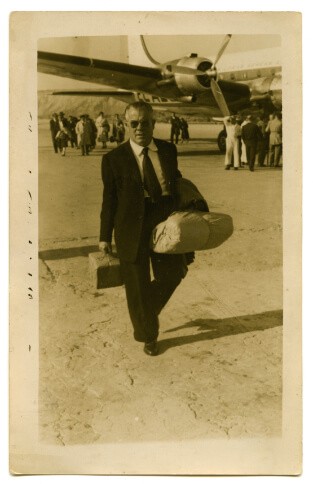
Above, Jesus Navarro on a journey to the Canary Islands to expand markets.
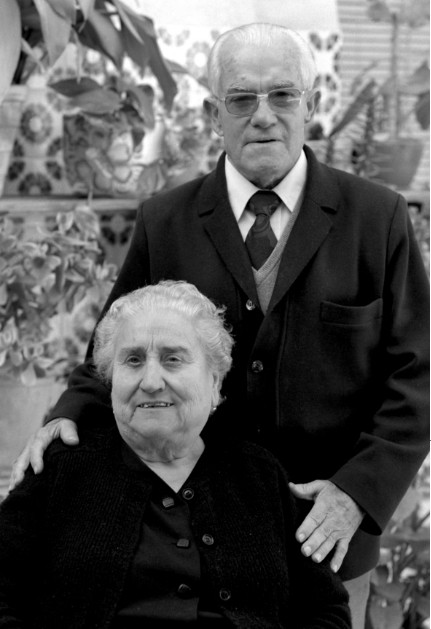
Jesus Navarro Jover learned to read as a teenager, when he realised it was the only way to escape from poverty. The son of peasants, in a family with six siblings, he was soon disabused of the idea that this months harvest was going to be better that the one the month before. This was in a village without any native wealth, where the landscape looks very much like that of Arizona and the river that waters it is salty, was too much to hope for. But he began working as a child, first collecting manure from the street to sell and carry a bit of money home; later in a factory making espadrilles. He made so many that this became the main source of the family’s income. Between one espadrille and another, he dreamed of working for himself, of being his own boss. Years later, so that no child be left uneducated, the gave away several parcels of land on the sole condition that they be used for public schools. Today the Jesus Navarro elementary school and the municipal Carmen Valero pre-school continue to honour their memory
At that time, in his home town of Novelda spices were traded, above all saffron, which was brought from La Mancha and later exported to Asia and Africa. That business spirit was born of necessity in a town without natural resources. The goal of Jesus was to do what others were already doing, but doing it better and, above all, differently. He always believed in that. Two key words were engraved on his soul: difference and leadership.
The final impetus came from the person who would be his companion and wife, Carmen Valero, daughter of the blacksmiths who made the carts and bars for the houses in town. Carmen gave Jesus the serenity, the calmness and also the hands that made the first paper sachets for him later to sell door to door in neighbouring towns and as far away as Murcia, which was another world in those days.
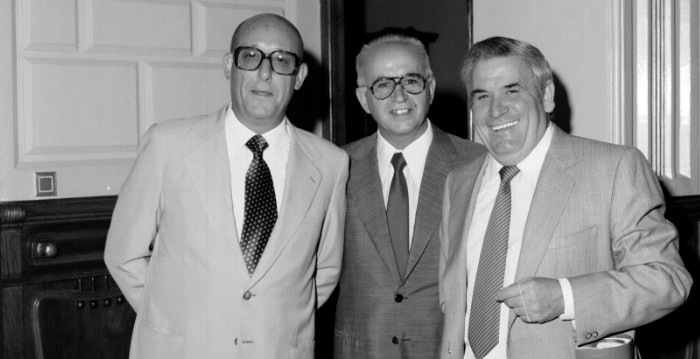
As a result of his tenacity, the business began growing immediately and other hands were needed. So his wife was joined by her sister and three or four neighbours, swift hands capable of transforming a kilo of saffron into 10,000 paper packets, the exact measure for those family stews sopped up with bread to the last drop in the pot. The saffron came from La Mancha in horse-drawn carts.
As the sachets at first were white, without any brand, he thought they must be different in some way, and so he chose the name of his eldest daughter and took a picture of the girl with a bow. That was in 1923. But another business in the area had a similar insignia. To be different, in an unconscious display of Marketing skill, he took off the bow, put a Cordoban hat on her, dressed her as an Andalusian and put a Manila shawl and carnation on her. Thus was born the Carmencita that we still know nowadays.
Around 1934, the women on the porch already numbered more than 30, and even in war times that number doubled. After the cruel post-war period, the doors of the family home were almost always open to help neighbours and anyone who needed it.
A short while later, when he dared to travel by boat to the Canary Islands, Jesus was forging the current success of the brand. Thanks to the heavy use of spices in traditional island dishes, he was starting, without realising it, the internationalisation of the brand, as the «carmencitas» travelled to Venezuela in the sorry-looking cardboard suitcases of immigrants attempting not to lose the smell, flavour and mother love they left behind on the island. In a way, Carmencita was their umbilical cord. It was and is, given that today the primary market is the American continent
Nevertheless, the sales volume never caused the close ties to its beginnings to be forgotten. Every morning, Carmen and her daughter Carmencita made café con leche and muffins for the workers who saw in the smile of that little girl with the Cordoban hat the courage of parents who set out on the road to prosperity with determination and sacrifice. And when, from 1955, machines were introduced to speed the packaging process, it was decided that no one would be made redundant, so diversification was sought: other spices and new packaging
The following generation, with Luis Navarro, Francisco Escolano and Jesus Navarro Valero, strengthened and greatly increased the founder’s values: tradition, but at the same time modernity, a vision of the future, and the spirit of leadership. With great effort they positioned the brand as the undisputed leader in the market.
Today it is the third generation that is being prepared for Carmencita to turn 100, with a new factory under construction that will be the most modern in Europe. Of course, it is located in Novelda, the town that always rises to the occasion, a town of fighters where the dreams of our grandparents become reality The anticipation of seeing in each passing how the arrival of this mythical year comes closer, the excitement that surrounds everything we do at this magical stage, the entranceway to great events. But it is just another stage; the baton will continue on its course
Carmen and Jesus, and their example of struggle and solidarity with society continue through time, unstoppable, eternal.
Carmencita, lending flavour and colour to your life for 100 years. Mission accomplished.
Carmen and Jesus, and their example of struggle and solidarity with society continue through time, unstoppable, eternal.
Jesus Navarro Jover learned to read as a teenager, when he realised it was the only way to escape from poverty. The son of peasants, in a family with six siblings, he was soon disabused of the idea that this months harvest was going to be better that the one the month before. This was in a village without any native wealth, where the landscape looks very much like that of Arizona and the river that waters it is salty, was too much to hope for. But he began working as a child, first collecting manure from the street to sell and carry a bit of money home; later in a factory making espadrilles. He made so many that this became the main source of the family’s income. Between one espadrille and another, he dreamed of working for himself, of being his own boss. Years later, so that no child be left uneducated, the gave away several parcels of land on the sole condition that they be used for public schools. Today the Jesus Navarro elementary school and the municipal Carmen Valero pre-school continue to honour their memory.

At that time, in his home town of Novelda spices were traded, above all saffron, which was brought from La Mancha and later exported to Asia and Africa. That business spirit was born of necessity in a town without natural resources. The goal of Jesus was to do what others were already doing, but doing it better and, above all, differently. He always believed in that. Two key words were engraved on his soul: difference and leadership.
The final impetus came from the person who would be his companion and wife, Carmen Valero, daughter of the blacksmiths who made the carts and bars for the houses in town. Carmen gave Jesus the serenity, the calmness and also the hands that made the first paper sachets for him later to sell door to door in neighbouring towns and as far away as Murcia, which was another world in those days.


Below on the right, Luis Navarro, Francisco Escolano and Jesus Navarro Valero positioning the brand as the undisputed leader in the market.
Above, Jesus Navarro on a journey to the Canary Islands to expand markets.
As a result of his tenacity, the business began growing immediately and other hands were needed. So his wife was joined by her sister and three or four neighbours, swift hands capable of transforming a kilo of saffron into 10,000 paper packets, the exact measure for those family stews stopped up with bread to the last drop in the pot. The saffron came from La Mancha in horse-drawn carts.
As the sachets at first were white, without any brand, he thought they must be different in some way, and so he chose the name of his eldest daughter and took a picture of the girl with a bow. That was in 1923. But another business in the area had a similar insignia. To be different, in an unconscious display of Marketing skill, he took off the bow, put a Cordoban hat on her, dressed her as an Andalusian and put a Manila shawl and carnation on her. Thus was born the Carmencita that we still know nowadays.
Around 1934, the women on the porch already numbered more than 30, and even in war times that number doubled. After the cruel post-war period, the doors of the family home were almost always open to help neighbours and anyone who needed it.
A short while later, when he dared to travel by boat to the Canary Islands, Jesus was forging the current success of the brand. Thanks to the heavy use of spices in traditional island dishes, he was starting, without realising it, the internationalisation of the brand, as the «carmencitas» travelled to Venezuela in the sorry-looking cardboard suitcases of immigrants attempting not to lose the smell, flavour and mother love they left behind on the island. In a way, Carmencita was their umbilical cord. It was and is, given that today the primary market is the American continent.
Nevertheless, the sales volume never caused the close ties to its beginnings to be forgotten. Every morning, Carmen and her daughter Carmencita made café con leche and muffins for the workers who saw in the smile of that little girl with the Cordoban hat the courage of parents who set out on the road to prosperity with determination and sacrifice. And when, from 1955, machines were introduced to speed the packaging process, it was decided that no one would be made redundant, so diversification was sought: other spices and new packaging.

Carmen and Jesus, and their example of struggle and solidarity with society continue through time, unstoppable, eternal.
The following generation, with Luis Navarro, Francisco Escolano and Jesus Navarro Valero, strengthened and greatly increased the founder’s values: tradition, but at the same time modernity, a vision of the future, and the spirit of leadership. With great effort they positioned the brand as the undisputed leader in the market.
Today it is the third generation that is being prepared for Carmencita to turn 100, with a new factory under construction that will be the most modern in Europe. Of course, it is located in Novelda, the town that always rises to the occasion, a town of fighters where the dreams of our grandparents become reality The anticipation of seeing in each passing how the arrival of this mythical year comes closer, the excitement that surrounds everything we do at this magical stage, the entranceway to great events. But it is just another stage; the baton will continue on its course.
Carmen and Jesus, and their example of struggle and solidarity with society continue through time, unstoppable, eternal.
Carmencita, lending flavour and colour to your life for 100 years. Mission accomplished